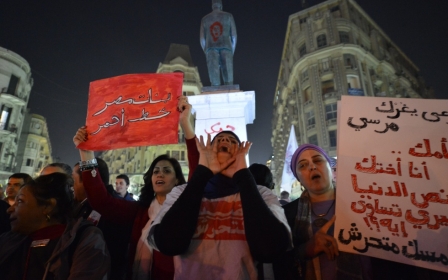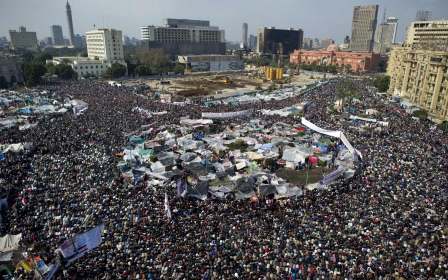Yes, the Arab Spring was worth it – it heralded the power of the masses

The Arab revolts were so significant, legitimate and powerful that the counter-revolutions had to be so significant, radical and powerful in order to contain them. The Saudis had to invade Bahrain with tanks. The Russians and the Iranians had to intervene in Syria. The Egyptian Gulf-sponsored military elite had to stage a coup in Egypt. The elite in Yemen had to agree on a compromising bargain. And the international actors had to deprive the Libyans of the right to establish a post-revolutionary order based on their autonomous self-determined revolutionary endeavours.
All of these interventions, and other more subtle civil-economic interventions, co-opted and diffused the first wave of revolts in the Arab world.
All eyes are on Tunisia, where the Arab Spring started. The Tunisian progress has been generally praised as a beacon of hope in a region of despair. The Tunisian “success story”, as it is being framed, is used against sceptics who see the Arab Spring as a tragic regressive chain of events.
But the Arab Spring is a historical wave of revolts that is worth appreciating, regardless of the success story of Tunisia. The cynical impressions on the Arab Spring follow a wave of counter-revolutionary movements that have managed to co-opt the revolution.
Although prospects of political and socio-economic progress in the region seem bleak, the initial revolts remain worthy of praise; as well as criticism, of course. It is important to admit that Arab counter-revolutions have been systematic and well-funded. The unfortunate overlap of mass uprisings and the fierce geopolitical contest between two regional powers meant that the chances of revolutionary change are slim.
It is equally important to admit the role the elite of the opposition, or the representatives of the revolutions, have played in the failure of the revolts and the rapid pace at which the counter-revolutions developed.
The first wave of revolts was systematically co-opted by proxies of regional powers; be it counter-revolutionary extremists or other rented forces. The second wave of revolts that we saw in Egypt was co-opted by the old guards. Yet, the second wave reached Tunisia and brought better and peaceful outcomes until now; thanks to the fact that Tunisia is less relevant to the geopolitical tensions in the Middle East.
Regardless of the justifications of the “despair” that the counter-revolutions brought, counter-revolutions are not a peculiar feature of Arab revolutions. Even civil wars are not a peculiar feature of Arab revolutions.
In academia, the causal relationship or even inter-changeability of the terms civil war and revolution can be inspected in a pile of research and observations on the matter. What seems to be a consensus, however, is that the escalation to civil war does not cancel out the legitimacy of a mass upheaval that preceded it. In other words, the two phenomena are not mutually exclusive, to say the least.
Revolutionary wave
Even the most glorified and romanticised revolutions in contemporary history have witnessed, in some way or another, several waves of revolts and brutal civil wars. For instance, the Russian Revolution is taken as a model in contemporary history. Yet, the Russian Revolution was not a single revolution, as in an event of protest or collective action. It was a process of workers’ unionisation, strikes and protests.
A series of Russian revolutions led to a brutal civil war between the so-called “Red Guards” – later becoming the Red Army – and the “White Army”, belonging to the anti-Bolshevik old guards. Despite that, the legitimacy and significance of the Russian Revolution is rarely, if ever, contested.
In a conceptually similar scenario, the civil war in Libya does not cancel out the fact that, at an earlier stage, the people of Libya collectively rose up against Gaddafi. Even populous anti-imperialist conspiracies that exploit the not-so-humanitarian Nato intervention in Libya are incapable of empirically denouncing the initial unencumbered uprising of the Libyan people.
So, the Arab revolts were significant but they were stopped halfway and the regional status quo has been largely saved, so they say. Then, why is it still useful to defend the Arab Spring when it generally failed to bring about democratic change and led to even more authoritarian regimes?
The answer has two dimensions. The first has to do with culture and the second has to do with power.
In terms of culture, the similarities between the rise of extremism in the Middle East and the rise of fascism in Europe demands a more thoughtful observation on Isis and its prospects. Working-class frustration catalysed the rise of fascism in Europe. The utter failure of the continental wave of working-class mobilisation and Communist insurgencies in the early years of the 20th century sowed the seeds of fascism.
In Italy, for instance, a revolutionary wave, referred to as “Bienno Rosso” (also known as “Red Biennium” in English) was overcome by a violent reaction by the so-called “Fascist Blackshirts” militia that took over the country under the guidance of an ex-socialist revolutionary figure, Benito Mussolini.
Fascism, being a self-destructive nihilist system, brought its own demise. Consequently, the surge of social democracies and social movements post-second world war institutionalised the values and culture of the revolutions in Europe. Considering the conceptual similarities between the rise of fascism in Europe and the rise of extremism in the Arab World, why don’t we entertain a similar potential cultural outcome?
As for power, no matter how radical the re-subjugation of the Arab societies by counter-revolutionary regimes, the very notion of “the people want…” and the experience of the collective can never be completely erased. The new Arab regimes and the old guards – those saviours and protectors of the status quo in the Middle East, know too well that the power of the masses can no longer be hidden from the masses, because they experienced it. And diverting this power or diffusing it into extremism or anti-extremism is unsustainable.
The re-emergence of the power of the Arab masses, the only legitimate power, is a perpetual threat to regimes. For this reason, and possibly this reason alone, the Arab Spring was worth it.
- Ibrahim Halawi is a London-based researcher and a PhD candidate in Politics at Royal Holloway University of London. His research focuses on power dynamics and counter-revolution in the Arab World. He has published contributions on Political Islam in the context of the Arab Spring and the geopolitical challenges to secularisation in the Arab World. Also, he founded a secular student-run newspaper in Lebanon.
The views expressed in this article belong to the author and do not necessarily reflect the editorial policy of Middle East Eye.
Photo: A rally in Tahrir Square, Cairo 2011.
Middle East Eye propose une couverture et une analyse indépendantes et incomparables du Moyen-Orient, de l’Afrique du Nord et d’autres régions du monde. Pour en savoir plus sur la reprise de ce contenu et les frais qui s’appliquent, veuillez remplir ce formulaire [en anglais]. Pour en savoir plus sur MEE, cliquez ici [en anglais].





